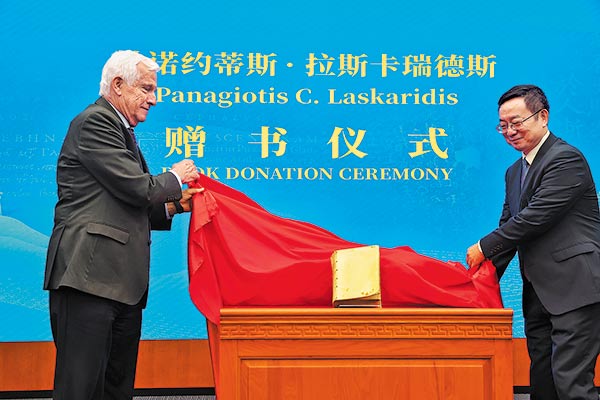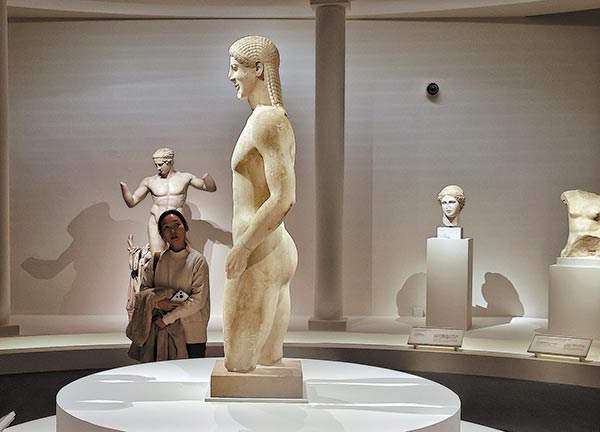
Panagiotis C. Laskaridis, chairman of the Aikaterini Laskaridis Foundation, presents two Aristotelian classics, both printed in the 17th century, to the Chinese Academy of Social Sciences during a book donation ceremony on Thursday, as a gesture of support for the first World Conference of Classics.[Photo by Jiang Dong/China Daily]
To make a serious comparison between Confucianism and ancient Greek philosophy, one must look further back, to the many centuries — or even millennia — that preceded the rise of these influential schools of thought, according to Athina Kavoulaki, an associate professor at the University of Crete in Greece.
Kavoulaki, who specializes in Greek literature, was in Beijing for the first World Conference of Classics from Wednesday to Friday. "Both ancient Greece and China experienced great development in the Bronze Age, which helped lay the ground for the intellectual flourishing that took place between the 7th and the 4th centuries BC," she says.
Judging by archaeological discoveries, China's Bronze Age began no later than the 20th century BC, during the late Xia (c. 21st century-16th century BC) and early Shang (c. 16th century-11th century BC) dynasties. The height of Greece's Bronze Age is best represented by the Mycenaean Civilization, which flourished between 16th century BC and 11th century BC. The two also had different cultural emphasis for their respective use of bronze. In China, although bronze weapons appeared during this period, the focus was undoubtedly on using bronze ware for rituals and ceremonies in state-sponsored events, while in Greece, bronze was primarily used for military and artistic applications, as in weaponry, armor and architecture.
Such a comparison may shed light on the cultural and political underpinnings of the two distinct philosophical traditions. "China during the Shang and Zhou (c. 11th century-256 BC) dynasties, known for their magnificent ritual bronzes, was composed of vassal states that all bowed to the reign of the Zhou ruler," says Wu Fei, philosophy professor at Peking University. According to him, this political arrangement, underscored by a unified belief system, had a profound impact on the basic tenets of Confucianism, which prioritized social cohesion, viewing morality as grounded in the context of family and society.
"In Confucianism, one's moral and ethical virtues are measured by how well one upholds society propriety and fulfills their roles within the family and society. With the state seen as an extension of the family, political engagement is often viewed as a natural outgrowth of one's moral development, a chance to translate knowledge into actions that promote social harmony," he says.
Political participation in achieving personal fulfillment was also advocated by ancient Greek philosophers, as Aristotle famously remarked in his work Politics that "man is by nature a political animal". In Aristotle's view, the polis, or Greek city-state, is the highest form of community, where people can fully realize their potential as rational and moral beings, partly through the performance of their civic duties.

Athina Kavoulaki, associate professor, University of Crete in Greece.[Photo by Jiang Dong/China Daily]
And the realization of that potential is closely associated with the notion of virtue in ancient Greek philosophy. "Virtue is for Socrates knowledge and for Aristotle excellence, of both character and intellect, which one can achieve through the exercising of body and mind," says Wu.
It's worth noting that Aristotle, in advocating for a virtuous middle path between deficiency and excess, came up with the concept of the Golden Mean, or Golden Middle Way, which corresponds with the idea of balance and moderation central to Confucianism in its quest for harmony.
Reflecting on the research methods of the classics, Wu believes that a cross-disciplinary approach is necessary. "Literature, history, and philosophy — the areas that now require separate departments in our universities — were once unified for our ancestors, who infused their literary and historical writings with the questions and musings of life, which gave rise to philosophy," he says.
Kavoulaki, who teaches ancient Greek literature, can't agree more.
"In my class, I speak about poets as being the first thinkers who proposed, through their visions and insights, major ideas that the Greek philosophers would later discuss more systematically," she says. "Major Greek poets like Homer and Hesiod first introduced themes like cosmology, theology and ethical values. That's why they were considered the teachers, the sages on whose works the philosophers had been educated.
"In ancient Greece, philosophers gradually developed an antagonism toward poets because they wanted for themselves to be recognized as the true wise men, although both had struggled for truth in life," adds Kavoulaki, who sees China's strong literary and poetic traditions a fertile ground for the development of philosophy, including Confucianism.
In fact, Confucius himself is believed to have compiled the oldest existing collection of Chinese poetry. Titled Shi Jing, or the Book of Songs, it is comprised of 305 works dating from the 11th to 6th centuries BC, and was enshrined through ancient Chinese history as a Confucian classic.
"Both ancient Greece and China had this very long chain of poetic artistic tradition, and another chain of philosophical tradition that intertwined with the literary tradition," says Kavoulaki. "That's where we can start from."

One of the donated copies, Aristotle's Nicomachean Ethics.[Photo by Jiang Dong/China Daily]

A visitor looks at a Greek statue at The Countless Aspects of Beauty in Ancient Art, an exhibition at the National Museum of China in Beijing on Wednesday.[Photo by Jiang Dong/China Daily]


